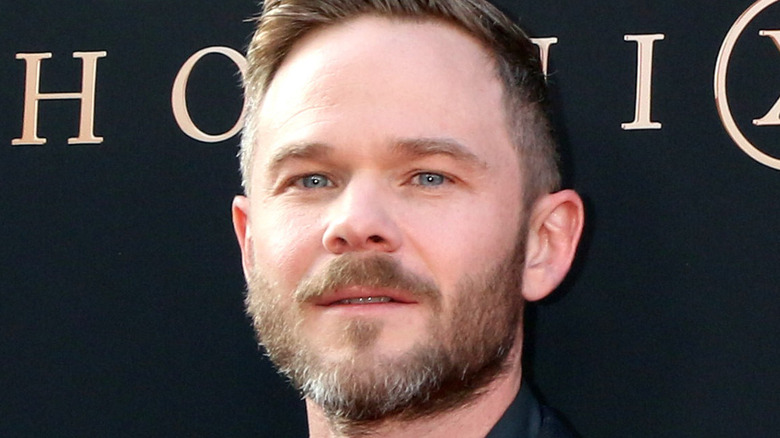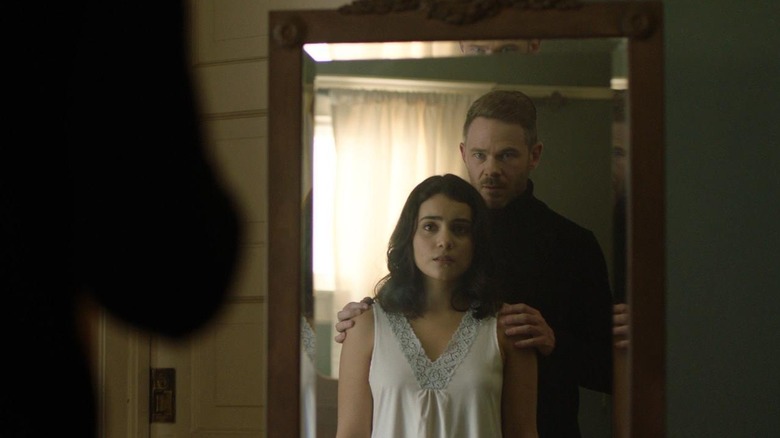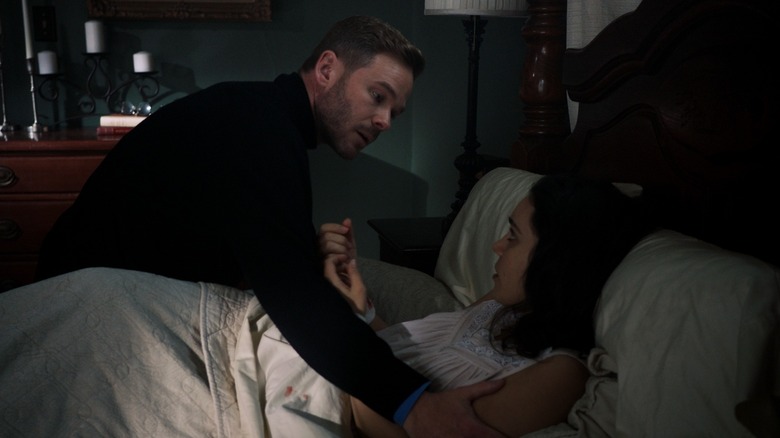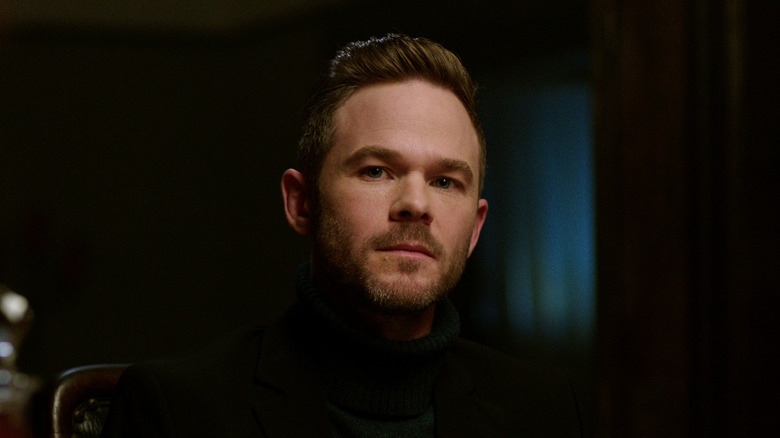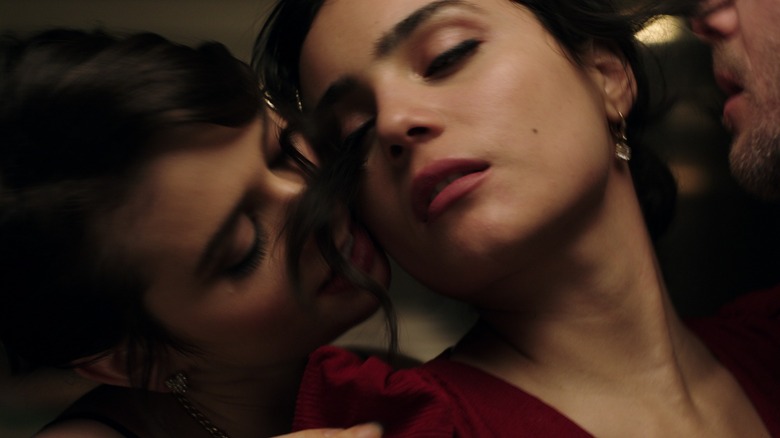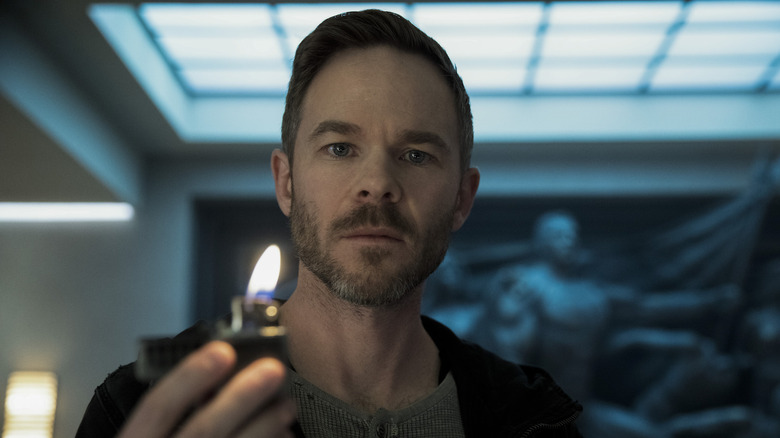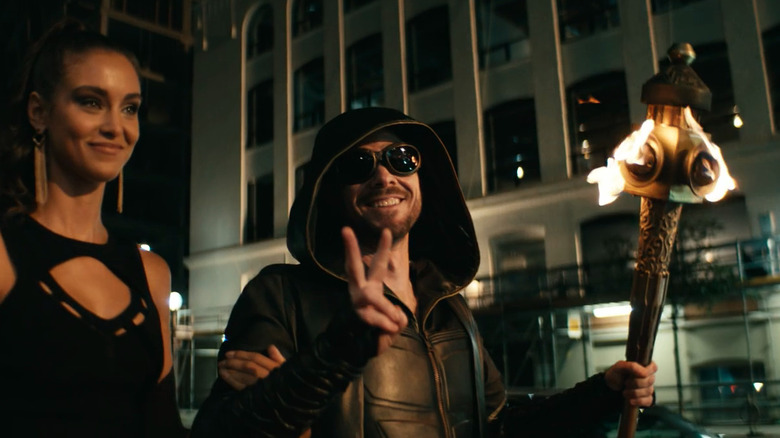X-Men's Shawn Ashmore Revels In Playing Morally Ambiguous Characters In The Free Fall And The Boys - Exclusive Interview
This article contains spoilers for the film "The Free Fall."
Shawn Ashmore first came to widespread attention when he landed the role of Iceman in the "X-Men" franchise. Ashmore had already racked up quite a resume before joining the iconic superhero team and has continued to stay busy with both film and TV projects in the two decades since the cinematic debut of the series. In that time, he's played everything from an FBI agent in the intense psychological thriller series "The Following" to an ill-fated American tourist in the sci-fi horror film "The Ruins." Currently, he can be seen on a weekly basis as defense attorney Wesley Evers on the ABC police procedural "The Rookie."
However, Ashmore's never played a character quite like Nick in the terrifying psychological puzzle box movie "The Free Fall." The character initially comes across as a devoted husband whose only goal is to protect his wife, Sara (Andrea Londo), after she wakes up with no memory following a suicide attempt. As the movie progresses, Ashmore slowly drops small but disconcerting hints that Nick may not be exactly what he seems. It's a subtle, unsettling performance that will keep viewers guessing until the film's shocking climax.
In an exclusive interview, Looper spoke to Ashmore about what attracted him to "The Free Fall," his process for developing his ambiguous character, and the scenes he had the most fun shooting. Ashmore also discussed his brief but exciting role playing the fire-powered superhero Lamplighter on the popular Prime Video series "The Boys" and whether he'd be open to returning to the show.
Going dark for The Free Fall
I thought "The Free Fall" had such an interesting premise. I didn't know where it was going for most of the movie. What attracted you to the project?
A big part of it was just what you said: the mystery. I was reading the film, reading the script, and I felt the same way. I was engaged the whole time, but I also had no idea where it was going, and so I wanted to get to that reveal. I was like, "What is the truth? What is happening?" Often, you read scripts like this, and then the reveal — it pales or it doesn't pay off or it's kind of like, "Oh, that's it," but I felt the opposite. I felt like the dinner scene in the movie, where everything goes haywire and revealed what it is, I was like, "Oh yeah. Okay, cool. Now I get what this is and why he's doing what he's doing." So again, I loved the script.
It was scary to me. It was super, super creepy, the idea of being trapped in a house with this person who loves you, but you don't know them. This is from Sara's perspective, obviously. I thought that was super bizarre. You come out of a mild coma, essentially, and you don't remember anything, but there's this person that's literally in your space being like, "Hey honey, how are you?" And you're just like, "Whoa." All the manipulation and back and forth that happens throughout the film, I thought [that] was interesting.
I don't normally get the chance to play characters like this ... In the last couple years I have. I played a character called Lamplighter in "The Boys," sort of a darker character, but I love this kind of character. I told Adam [Stilwell], the director, when we sat down, "I need to play this part." Very rarely do I walk in and I'm like, "I need this. This is for me. I guarantee you that I will crush this. This is something that I need to do. I'm in love with this character. I'm in love with the script." And we did. We had a long conversation about it, and I told him, "I need to make this movie." That was the only meeting we had. We clicked. We talked for like an hour and a half and almost on the way home from the meeting, I got the call being like, "Hey, I think they want you to do the film."
I just loved it. It's bizarre and weird, like what a strange story this is ... I loved every minute of it.
Finding the truth in the ambiguity
The character is very ambiguous. It's clear that he's a loving husband who's doing his best in very difficult circumstances, but then there's this little hint that something else is going on. What was your process for developing that ambiguity?
The most important thing was to play it truthfully. When I say that, I mean Nick needs Sara. He does love Sara. He has this hole that he's trying to fill, and this person, his wife, will fill that. I didn't want the whole thing to be manipulation. When he's professing his love and when he's breaking down to her, he means that. A big part of this conversation with her is, "I don't want you to [try to] kill yourself again. I don't want you to leave me. I need you with me." He means that. Those moments of real vulnerability with her are genuine. It's not necessarily what the audience thinks. His intentions or his motivations aren't what the audience thinks, but that doesn't mean that they're not legitimate and real and pure.
I tried not to judge Nick. Just what are his needs? The ambiguity that you're talking about really just came through in the script. We definitely did slightly different takes where here's a more intense version of Nick, a more grounded version of Nick, and then something in the middle ... was what landed in the editing process. That's what worked for the performance and for the film, but that's mostly because the script was so tight. All the reveals and stuff were there in the story so we didn't have to play into it too much. It was about trying to be as real as possible and be true to what Nick needs and what he wants. That was it. I just approached it that way.
Embodying a "man out of time"
The dynamic between you and Andrea Londo, who plays your onscreen wife, is really intense and interesting. How did you work together to create your characters' relationship?
I did a ton of preparation with Adam — everything from us discussing a character in the script and the breadcrumbs that we wanted to leave for the audience so that if they go and watch the film again they don't feel like they're tricked by the reveal. All the details and the truth [are] there, you're just maybe not looking at it in the right way. He and I talked a lot about that.
We also talked a lot about [Nick's] physicality. [Stilwell] used [the examples of] Anthony Perkins [from "Psycho"] and [John] Cassavetes from "Rosemary's Baby," like the turtlenecks, the man out of time. Like the way he dresses, it's not really contemporary, it's kind of strange. There were moments where [Stilwell] was like, "I want you to think about, when you're sitting on this chaise lounge, don't hunch over like you do. Think about the body language of this sort of man out of time." We used a lot of references from "Rosemary's Baby" and Perkins from "Psycho" and stuff like that. Even the way that Nick leans in a doorway and stuff like that. There's very specific imagery and physicality that Adam wanted to think about that we put into it.
We did a lot of work on that, but Andrea and I didn't talk at all. We just showed up and started shooting. And a lot of that was strategic, because these two are strangers in a way. The characters are meeting each other. We both did our own work and then came in and met each other and had this conversation. The whole movie, really, for the most part, it's two people talking, so I had no idea what Andrea was going to do, how she was going to play Sara. It didn't really matter.
I knew what I wanted to do, and then you just jump in with another actor and then you find the scene together. Planning what she was going to do, and so that I knew how to react, it didn't really matter. We just got there on the day and played these scenes. There were two very strong characters with two completely different motivations. We both knew what we wanted to do, and then you meet together and then whatever happens, happens. We approached it like that. We just found the relationship between these two as we shot the scenes.
Again, a big part of that is it's just these two people together, and the script was really, really tight. It was very specific. It was very tight. There wasn't a lot of offshoots story-wise or character-wise. It was really just these two people in this particular situation trying to hash it out. Nick is trying to win his wife back. Sara is trying to discover what the truth is, who she is, who Nick is, all these things. It's very clear on what they were trying to do. We just jumped in together and found those scenes together.
Revealing Nick's True Colors
Most of the film is really serious, but then there's the dinner party scene you talked about earlier where the tone becomes almost farcical.
Like a carnival.
What was that scene like to shoot?
It was incredibly long. That's the first time in the film where there's more than, again, Sara, Nick, and Rose. Those are the three characters you see. And there are other offshoots. There's Sara's sister, there's the parents, but for the most part, it's these two or three characters interacting. The world opens up and all these people are now in this house that's been so quiet and alone and scary. That's really the scene that I read where I was like, "Oh, if we do this right, it's going to feel amazing." It's so bizarre, and where the truth starts to open up and unveil to the audience. It was super fun to shoot.
There is that nervousness of, well, the movie takes such a strange turn there. It becomes something totally different. How do we transition from this quiet piece where this fractured couple are trying to find their relationship again and find this intimacy and connection to, whoa, this just goes crazy! I think it works so well. When I watched the film the first time..., it's such a jarring experience of change, but it works. Everything works about it. The editing, the music, the performance, everything just goes a little sideways. And I love it. I love what happens.
It was fun to shoot. I feel like Nick sheds his skin a little bit. He becomes himself, and he warns Sara before the dinner party. He says, "I might show off a bit," so it's foreshadowed that things are going to go a little crazy, and then he does. Another thing we talked a lot about too is in a relationship, if you're just together, you're just dealing with each other. You really discover a lot about another person that you're intimate with or involved with when you see them out in public. How do they behave with other people, with your friends, with their friends? Are they a chameleon? Do they adapt to what other people are doing or do they stay true to who they are? I think Sara sees Nick's true colors when he's with his people, with these friends — her old friends, but Nick's friends. It just went haywire and crazy, and then the dancing — it just goes nuts. Everybody gets drunk and it becomes like a carnival. That's the way that I explain it. It seems like it goes into a wild carnival.
And the scene ends with you wearing this bloody pig's head. I have to ask, were you actually wearing a pig's head or was it something else?
No. It's funny that you actually say that because, to me, it literally was just almost like a Halloween mask. It was really flimsy and so we had to be very careful taking it on and off. It was a good mask, but it didn't have the weight or heft. It was very rubbery. When I [took] it off, I had to do it so carefully so that it didn't compress, so it looked like a Halloween mask, and then to [gently] put it down into the bloody bathtub. So no, it was just a Halloween mask.
But yeah, fun sequence. Again, I really liked the tableau that was in the background. Time freezes for everybody except for Sara and Nick in this moment, and then Rose approaches, and it's just this beautiful tableau. It feels like an old painting in the background, and it's a cool, trippy, weird moment. Again, the movie goes to another level at that dinner party and then [pushes] forward. It was fun to shoot. I think it's effective, [and] I really like how it turned out.
Playing Against X-Men for The Boys
You also mentioned that you played another morally ambiguous character recently, Lamplighter in "The Boys." What was it like to join that show for this short but pivotal arc?
So scary, because I was a huge fan of the show. I loved the first season. It was my favorite show [in] whatever year that it was that it came out ... "The Boys" subverts everything that we know about comic book and superhero movies. That's what I love. People are like, "I don't know what I like about it." It's because if superheroes were real in our reality, this is what they would be like. Somebody would manipulate them, create a business around them. It is what it is. It's what's happening with Marvel right now. I don't know if you've seen "Hawkeye," but they touch on it. They make a "Steve Rogers" musical. I'm like, "Yes, this is it." They would be celebrities. [Hawkeye] Clint [Barton]'s walking around getting free meals. It's like, "Yes, this is what it would be, this is the reality." So "The Boys" did it first.
I just love that take on it. I love the corrupt nature, and how could you blame them? If we had these abilities, would we all be heroes? Some of us would. The other would take advantage of this celebrity status that they have, the power to do whatever you want.
I loved the idea of playing against Iceman [the character he played in the "X-Men" movies]. I mean, that's why they cast me. That's why they came to me with this role. It was very obvious to me. And I was like, "Oh, good. We're in on the joke. We all understand what this is." I'm going to play Pyro [the X-Men's version of a superhero that controls fire] in "The Boys." That's fun. I get it. I really want to do this.
I was really nervous, though, because I was like, "I don't want to screw this up." I love this show. It's my favorite show on TV. I want to come and be a strong part of it, and then I read the episodes, and the episodes were amazing. I loved the character. A lot of the work was done for me, though, because they've been talking about Lamplighter throughout the first season. It's this established character: former member of [The Boy's superhero team] The Seven, did all these horrible things to the grandchildren [of Mallory, the founder of the Boys], [there were] arguments between Frenchie and [Mother's Milk] about it. It's this established character, all the groundwork was done, so all I had to do was show up, and it was like, "Oh my God, it's Lamplighter." Like, "Oh, crazy, here he is."
It was amazing. The cast, the writing, the direction — it was so fun. I knew that Lamplighter was going to die before I accepted the role. I knew that it was just a short arc, and I was bummed. I was like, "Cool, great. Eventful and impactful." Once I started shooting, I was like, "Oh man, I don't want this to end. I love this character. I love the journey, I love the relationship with Hughie, I love where it could go." It was a bummer that it ended, but also it was so impactful, I think.
On donning Lamplighter's superhero suit again
Any chance we'll see Lamplighter in future seasons of "The Boys" in flashbacks or something?
Well, I think that's the only way. I joked because they made this beautiful, insane Lamplighter costume that was crazy. It [took] months to make and to fit, and they do such an incredible job. [It] rivals the "X-Men" as far as costumes because I've done a couple of superhero costumes, and the "X-Men" fittings and the detail and stuff that they did was insane, but "The Boys" is at that level or higher. Again, I got a cloak and stuff, and a hood, so it's a cooler costume, but they put so much effort into making that, I was like, "That's it?" We only really saw him in it twice. So I joked when I was leaving, "You got to do like a bottle episode in a season where you go back in time where it's the original Seven or something like that." I doubt it's going to happen, but I'd be down if it came along.
The Free Fall is now playing in select theaters and is available on VOD and digital.
This interview has been edited for clarity.
